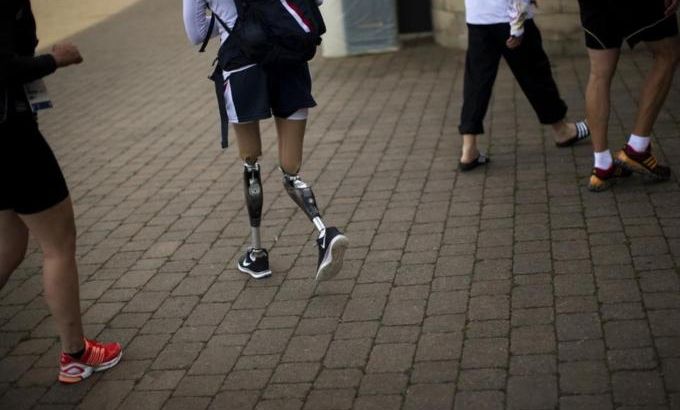Queen Elizabeth II opens London Paralympics
Ceremony aimed at challenging perceptions about disability starts 11 days of sporting action for 4,200 athletes.

Queen Elizabeth II has officially opened the London Paralympics, at a showpiece ceremony aimed at challenging perceptions about disability and celebrating the triumph of the human spirit.
She declared the Games open in a short speech on Wednesday in the traditional curtain-raiser to 11 days of sporting action at an event involving over 3,000 performers after a fly-past by a disabled pilot.
London 2012 chief Sebastian Coe said he hoped the Games “would be a landmark for people with a disability everywhere, a landmark in the progress of mankind towards the light, towards seeing immense capability and possibility”.
The president of the International Paralympic Committee, Philip Craven, added that the Games were “a celebration of the human spirit” that had “the energy to change each and every one of us”.
The show began with a rare public appearance by Britain’s most famous living scientist, Stephen Hawking.
Hawking, author of the best-selling A Brief History of Time who has motor neuron disease and has been paralysed most of his life, was described by organisers as “the most famous disabled person anywhere on the planet”.
‘Rational laws’
Hawking guided a central character on a journey of discovery in a story inspired by William Shakespeare’s The Tempest, taking in the Big Bang theory on the creation of the universe about which he has written extensively, to the 18th century “Enlightment” period and scientific discoveries of the modern era.
“We live in a universe governed by rational laws that we can discover and understand,” Hawking said through his voice-synthesised computer.
“Look up at the stars and not down at your feet. Try to make sense of what you see and wonder about what makes the universe exist. Be curious.”
The ceremony was billed by organisers as a “celebration of the inspirational spirit of the Paralympic Games that challenges perceptions of human possibility”.
Margaret Maughan, Britain’s first Paralympic gold medallist at the inaugural 1960 Games, was given the honour of lighting the cauldron, made of more than 200 “petals” and engraved with the names of participating countries.
Now 84, she will receive the flame from British soldier Joe Townsend, who was to descend on a zip wire from the 377ft high ArcelorMittal Orbit observation tower overlooking the stadium.
Townsend, a Royal Marine commando, lost both legs when he stepped on a homemade bomb in Afghanistan but is now an aspiring Paralympic triathlete hoping to compete in Rio de Janeiro in 2016 when the sport makes its debut.
Near-sell-out crowd
Among the 80,000-strong crowd were the queen’s grandson Prince William and his wife Catherine, David Cameron, UK prime minister, and Boris Johnson, London mayor, with the event broadcast to millions around the world.
From Thursday, a record 4,200 athletes, including an unprecedented number of women, from 165 countries will compete for 503 medals in 20 sports in front of a near-sell-out crowd for the first time in the Games’ 52-year history.
A total of 166 countries had been due to take part but the International Paralympic Committee on Wednesday confirmed that Malawi’s team had not travelled to London to compete in what would have been the country’s first Paralympics.
Organisers believe much of the increased domestic interest in the event comes after a successful Olympics for British athletes, which saw the host nation finish third in the overall medal table behind the US and China.
‘Spiritual home’
Britain is considered the “spiritual home” of the Games, as the first recognised sports events for athletes with disabilities was held in Stoke Mandeville, southern England, in 1948.
The flame – created from four others kindled on the highest peaks of England, Scotland, Wales and Northern Ireland – was brought to the venue in a 148km overnight relay from Stoke Mandeville to London.
Shooting is set to provide the first gold of the Games on Thursday in the women’s 10m standing air rifle.
Medals are also up for grabs in the velodrome with the finals of the men and women’s individual pursuit, in four weight categories in judo at the ExCeL Arena and at the Aquatics Centre, where 15 swimming finals are to be held.
The showpiece athletics programme gets under way on Friday with the spotlight on South Africa’s Oscar Pistorius, who is seeking to defend his T44 100m, 200m and 400m titles from Beijing four years ago.